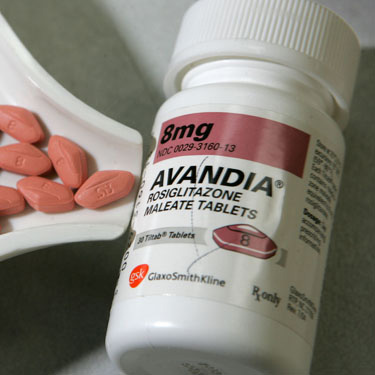FDA Removes Restrictions on Avandia, But is it Too Little Too Late?
By Kelly Close

On November 25, the FDA announced the removal of the major restrictions on the prescription and use of GlaxoSmithKline’s Avandia (rosiglitazone) for type 2 diabetes. Based on re-examined and updated evidence, the FDA decided that use of Avandia does not show an increased risk of cardiovascular disease (disease in the heart and blood vessels). This means that Avandia, which used to carry a severe warning for risk of heart failure, will now have its restrictions lessened and can now be available to the general type 2 diabetes population. However, given the bad press the drug has received and the low level of current sales, it’s not clear if many doctors will prescribe it or patients will take the drug in the future. Avandia is now off-patent, which means that generic rosiglitazone drugs are more affordable for patients.
Avandia is a thiazolidinedione (TZD) that affects insulin resistance and sensitizes the body to insulin. It launched in 1999 and was one of the best-selling diabetes drugs on the market despite a challenging side effect profile that included weight gain, edema, and an association with symptoms of congestive heart failure. Still, Avandia remained popular because of its effectiveness in lowering A1c and because it had a long “duration” (meaning, it was effective for a longer period of time). In 2007, a controversial meta-analysis (a combined analysis of multiple studies) suggested that it could increase the risk of heart attacks. These results created widespread media attention, increased fear and uncertainty for patients, and led to the FDA’s onerous cardiovascular requirements for diabetes drugs in development, which are still hotly debated (see the discussion on CVOTs for Farxiga in this issue). Re-examined results from the RECORD clinical trial did not confirm the increased risk of heart attack or death from use of Avandia. Ultimately, the Avandia saga underscores the importance of calm decision-making and proper data interpretation. To learn more about the history and controversy of Avandia, please read our learning curve here. –NL/KC







